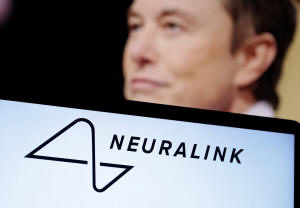At Musk’s brain-chip startup, animal-testing panel is rife with
potential conflicts
 Send a link to a friend
Send a link to a friend
 [May 05, 2023]
By Rachael Levy and Marisa Taylor [May 05, 2023]
By Rachael Levy and Marisa Taylor
(Reuters) - Elon Musk’s brain-implant venture has filled an
animal-research oversight board with company insiders who may stand to
benefit financially as the firm reaches development goals, according to
company documents and interviews with six current and former employees.
Such oversight boards are required by federal law for organizations
experimenting on certain types of animals. The panels are charged with
ensuring proper animal care, high research standards, and the
reliability of data that helps regulators decide whether drugs or
medical devices are safe for human testing.
The membership of the panel at Musk’s company, Neuralink, raises
questions about potential violations of conflict-of-interest regulations
aimed at protecting research integrity, a dozen animal-research and
bioethics experts told Reuters. Neuralink is conducting animal
experiments as it seeks regulatory approval for human trials of a brain
chip intended to help paralyzed people type with their minds, among
other ambitious goals.
Nineteen of the board’s 22 members were Neuralink employees as of late
2022, according to a company document reviewed by Reuters. The oversight
board’s chair was the Neuralink executive who led the company’s
animal-care program, and at least 11 other members were employees
directly involved with animal care or research.

Details of the panel’s membership and its potential conflicts have not
been previously reported. Insight into its makeup comes in the wake of
two federal investigations, first reported by Reuters, into potential
animal-welfare violations by Neuralink and allegations that it
improperly transported dangerous pathogens on implants removed from
monkey brains. Reuters reported in December that some employees had
grown concerned about the animal experiments being rushed under pressure
from Musk to speed development, causing needless suffering and deaths of
pigs, sheep and monkeys.
It’s possible the board’s membership has changed since late last year.
Musk and Neuralink didn’t respond to requests for comment for this story
or previous Reuters articles about the investigations into its animal
testing.
The review boards are known as “institutional animal care and use
committees,” or IACUCs. The animal-research and bioethics experts said
it’s rare for IACUCs to include employees with such direct financial
stakes in the research outcome. Putting employees on such panels poses a
particular problem at startups such as Neuralink because they tend to
focus on a single breakthrough product and commonly reward employees
with volatile company shares.
Neuralink staffers typically are compensated with salary and stock-based
incentives, according to five current and former employees and Neuralink
job advertisements reviewed by Reuters. Two of the staffers said some
senior-level employees stand to make millions of dollars if the company
secures critical regulatory approvals. Reuters couldn’t determine the
compensation terms of the Neuralink IACUC members who are also company
employees.
Neuralink shareholders could see big gains if the private company’s
valuation, currently more than $1 billion, continues to soar. Successful
animal trials are critical for the company to gain federal approval for
human trials and, ultimately, brain-implant commercialization. Reuters
reported in March that the U.S. Food and Drug Administration rejected
Neuralink’s first human-trial application, in part because the company
had not proven the device’s safety in animal tests.

Dr. Miguel Nicolelis, a neuroscientist and physician, has conducted
brain-implant research at Duke University for nearly three decades. He
said the IACUC members overseeing his animal experiments never had any
role in the research, including animal tests of the same type Neuralink
is conducting now. The independence of such boards, Nicolelis said, is
critical to protecting the integrity of animal research that could
impact humans in future clinical trials.
“It’s an obvious conflict of interest,” he said of the Neuralink board’s
composition.
ROCKY PARTNERSHIP
Many companies outsource animal testing and oversight to universities or
research institutes with strict rules to prevent such conflicts of
interest, the animal-research and bioethics experts said. These
institutions generally prohibit people with direct financial interests
from serving on IACUCs or voting on animal experiments.
Neuralink originally partnered with the University of California, Davis,
to help conduct and oversee its animal tests. But the company later
ditched the university after a dispute, viewing the school’s processes
as too slow and bureaucratic, one current and one former Neuralink
staffer said. Neuralink then brought the research and oversight
in-house.
UC Davis declined to comment on Neuralink’s new oversight board but said
in a statement that its conflict-of-interest rules prohibit “interested”
parties from voting or “influencing decisions” on such panels.
The U.S. National Institutes of Health is the world’s largest public
funder of biomedical research. On projects it backs, the agency bars any
IACUC member deriving income or stock from a research sponsor from
reviewing or voting on that sponsor’s animal research, said Dr. Patricia
Brown, the director of the NIH’s Office of Laboratory Animal Welfare.
The NIH declined to comment on Neuralink’s board. The agency once
reached out to Neuralink to offer funding and guidance under a program
intended to boost brain-implant research, Reuters previously reported.
Neuralink wasn’t interested in NIH funding because Musk wanted to avoid
public oversight and perceived bureaucratic hurdles.

The U.S. Department of Agriculture (USDA) is the lead agency enforcing
animal-welfare regulations. The animal-research experts interviewed by
Reuters, including two former top USDA officials, described the agency’s
overall enforcement of conflict-of-interest rules as lax.
USDA regulations forbid IACUC members from participating in the “review
or approval of an activity in which that member has a conflicting
interest.” But that rule doesn’t clearly define a conflict. It does
offer, as one example, a situation in which a board member is
“personally involved in the activity.”
[to top of second column]
|

Neuralink logo and Elon Musk photo are
seen in this illustration, December 19, 2022. REUTERS/Dado Ruvic/Illustration
 The USDA has interpreted the rule
narrowly, the experts and former agency officials said. The agency,
they said, rarely flags a conflict unless an IACUC member votes to
approve a particular experiment the member is also directly running
as a company employee. Beyond that, the USDA allows a range of
potential conflicts that would never be permitted in human trials,
which are overseen by other federal agencies that have similar
conflict-of-interest regulations, the experts said. Conflicts such
as the ones on Neuralink’s IACUC also are typically prohibited or
avoided in animal trials by universities, research institutes and
many companies.
In response to an inquiry from Reuters, the USDA said it had found
no conflicts of interest on Neuralink’s board when the department
inspected its animal-research operations during 10 inspections since
2020. The company has passed all inspections with no citations,
according to public records and a person with knowledge of the
examinations.
The agency declined to answer detailed questions about its legal
interpretation or enforcement of conflict-of-interest rules for
animal research and oversight.
The USDA’s Office of Inspector General, the agency now probing
potential animal-welfare violations by Neuralink, is also
investigating allegedly slipshod Animal Welfare Act enforcement by
the USDA itself, in a joint probe with the U.S. Department of
Justice, Reuters has reported.
The USDA and Justice Department declined to comment on the
investigation. The USDA inspector general didn’t respond to requests
for comment.
The joint probe is examining the agency’s oversight of Neuralink and
of animal welfare more broadly. The investigation follows a long
history of USDA OIG reports, including three since 2014, blasting
the agency’s animal-welfare enforcement as ineffective. One issue is
a stretched staff: The USDA employs 122 inspectors to inspect 11,785
facilities, ranging from zoos and breeders to labs, according to a
Congressional Research Service report last July.

USDA enforcement of conflict-of-interest rules is rare. In more than
11,000 USDA inspections over the past decade, the agency issued
eight citations for conflicts at research labs, none of which
resulted in a penalty, according to a review of the records by
Delcianna Winders, who oversees the Animal Law and Policy Institute
at the Vermont Law and Graduate School. The lack of enforcement, she
said, poses a serious risk that conflicted IACUC members will put
their own interests before those of the animals.
“The USDA is really only inspecting paperwork and not looking under
the hood,” she said. The case of Neuralink’s board, she said,
illustrates the problem with “the overly narrow interpretation the
USDA is giving to ‘conflicting interest.’”
ANIMAL WELFARE ‘INCIDENT’
Between September 2017 and December 2020, Neuralink partnered with
the University of California, Davis, relying on the school’s
federally funded primate-research lab and its established IACUC. UC
Davis received more than $1.9 million from Neuralink for experiments
before the partnership ended, the university said. Neuralink
surgeons and other staffers continued to work directly on the
experiments, in consultation with the university.
A UC Davis spokesperson told Reuters the university’s monitoring of
Neuralink’s experiments detected an animal-welfare incident in 2019,
prompting the university’s IACUC to mandate changes in Neuralink’s
research protocols and training. The spokesperson said the incident
didn't involve UC Davis staff but declined to comment further.
Amid tensions, Neuralink canceled its partnership with UC Davis in
2020, then built its own animal-testing facilities and created its
own IACUC.
Neuralink’s IACUC is charged with limiting the number of animals
tested to the minimum required for research. Tested animals are
typically killed after experiments so researchers can examine them
post-mortem.
The company has rushed and at times botched experiments, especially
after it brought animal experiments fully in-house, according to
Neuralink staffers and company records seen by Reuters. The
company’s IACUC allowed Neuralink to accelerate animal experiments,
in line with Musk’s demands, three sources familiar with the panel’s
decisions told Reuters.

In 2021 and 2022, the company killed about 250 sheep, pigs and
primates, the company records show. In one instance in 2021, the
company implanted 25 out of 60 pigs with the wrong-sized devices,
Reuters previously reported. Neuralink employees said the error
could have been avoided with better preparation.
Several animal-research experts called the role of board chair
Autumn Sorrells — also the executive heading Neuralink’s animal-care
program — a particularly troubling conflict.
Sorrells didn’t respond to requests for comment.
Several of the 22 IACUC members also report to Sorrells in their
Neuralink jobs, separate from the board, according to internal
documents and two Neuralink sources with knowledge of the
committee’s operations. This dynamic discourages those members from
dissenting in board matters, one of the sources said.
Neuralink never disclosed other IACUC members’ close connections to
Sorrells to USDA inspectors during an inspection in January that was
prompted by the December Reuters report and related scrutiny from
U.S. Congress members, according to a federal official with
knowledge of the agency’s dealings with Neuralink. Inspectors likely
would have examined the potential conflicts more closely if those
connections were disclosed, the official said.
(Reporting by Rachael Levy and Marisa Taylor; editing by Michele
Gershberg and Brian Thevenot)
[© 2023 Thomson Reuters. All rights
reserved.]This material may not be published,
broadcast, rewritten or redistributed.
Thompson Reuters is solely responsible for this content.
 |